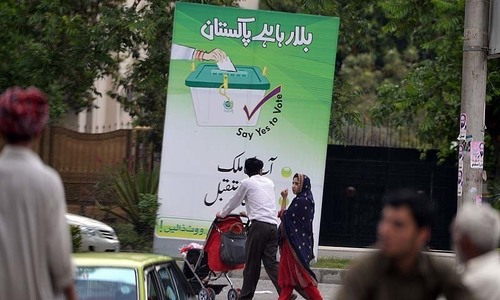Amidst criticism of its decision to go ahead with the i-voting process for overseas Pakistanis in the October by-elections, the Election Commission of Pakistan (ECP) held a joint press conference with National Database and Registration Authority (Nadra) officials to debunk complaints about the software that will be used to enable overseas Pakistanis to vote.
The ECP's Director General of Public Relations, Nadim Qasim, reiterated in the conference that overseas Pakistanis have the right to vote and that this was an effort that political parties "should admire".
"The ECP is not acting in haste," he said, "it is fulfilling its constitutional responsibility."
The process of registering overseas voters is ongoing, the ECP spokesman said. It began on September 1 and will conclude by the 15 of the month. The commission hopes that the maximum number of voters can be registered in the last few days.
An awareness campaign has also been launched to inform Pakistani nationals living abroad about the i-voting mechanism. A video message will be broadcast on state-run PTV and ads will be printed in newspapers, Qasim revealed.
"The ECP is doing everything with regards to the awareness campaign," the spokesman said, adding: "The website has reached one million people."
He explained that only National Identity Card for Overseas Pakistanis (Nicop) and Machine Readable Passport (MRP) holders can be registered for the i-voting process. He urged all overseas nationals to register for the by-elections.
After voters register, they will be sent a passcode on their provided email before October 14. The passcode will be issued between 8am and 6pm, Pakistan Standard Time.
The spokesperson said that i-voting of overseas Pakistanis is a "pilot project" and its report will be presented before the parliament.
The ECP will be holding by-elections in 37 constituencies for both national and provincial assembly seats on Oct 14. The Overseas Voting System (www.overseasvoting.gov.pk) has listed the constituencies for voting on the website’s homepage.
After the ECP launched its website for overseas voters on August 31, election observers had voiced skepticism about the system’s "credibility and transparency".
Ahmed Bilal Mehboob of the Pakistan Institute of Legislative Development and Transparency (Pildat), an NGO working for the promotion of democracy in the country, had said one of the concerns was that the i-voting system can "easily subjected to cyber attacks or manipulation".
Bilal had also expressed concerns about the requirements for registration for i-voting.
"Firstly, a large number of Pakistanis — especially in the Middle East — would be excluded from the voting process as they will not have an email address," he had said.
"Secondly, there is nothing that can ensure that the person is freely using his right to vote online and not being coerced by someone."
Political parties have also expressed concerns about the i-voting process. PML-N spokesperson Marriyum Aurangzeb said that the i-voting system launched by the ECP was "technologically faulty".













































